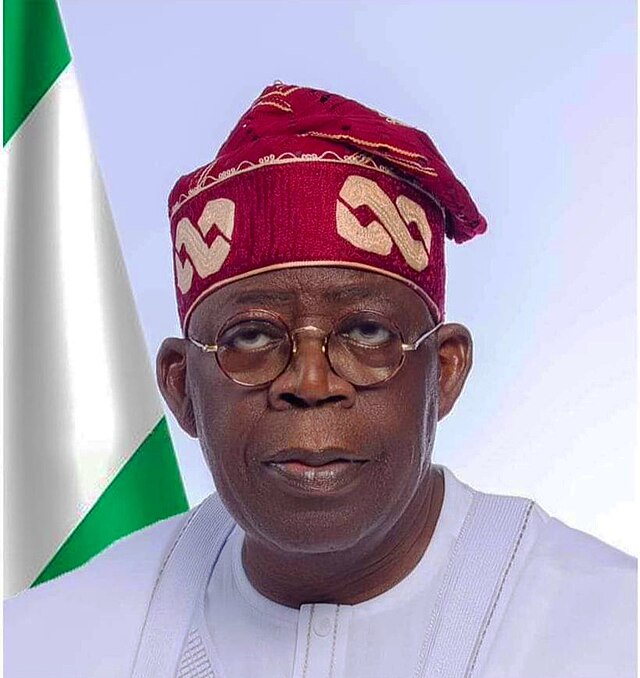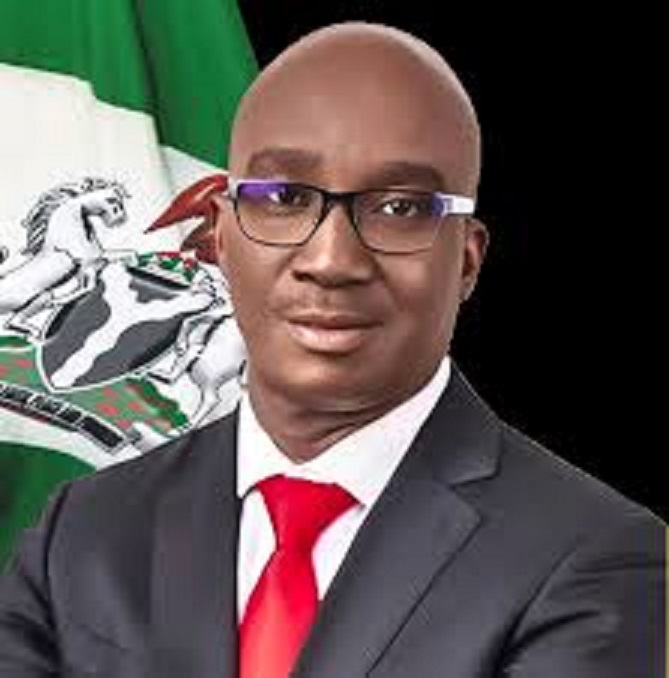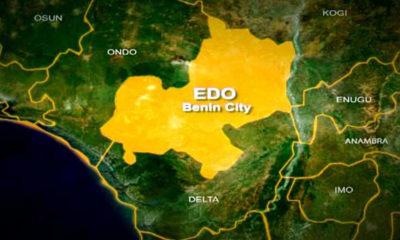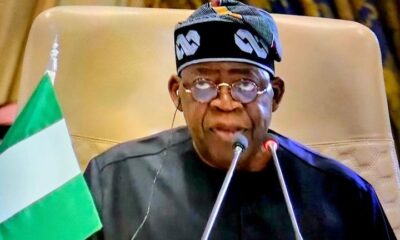NEWS
Tinubu Urges World Leaders To Deepen Ties Among Member States

. . . Insists on permanent seat for Nigeria, other African nations at UN Security Council
. . . Calls for collective action against hunger, terrorism, climate change, others
. . . Seeks renewed financial architecture, debt forgiveness for developing countries
. . . Says pursuit of individual national priorities undermining resolutions of global challenges
President Bola Ahmed Tinubu has called on world leaders to recommit themselves to multilateralism by deepening relations among member states of the United Nations (UN) in line with the principles of inclusivity, equality and cooperation.
This, he said, is the surest guarantee of global action against existential challenges faced by the international community.
ALSO READ: Shettima Leads Nigeria’s Delegation To 79th UNGA
President Tinubu who is the Chairman of the Authority of Heads of States and Government of the Economic Community of West African States (ECOWAS) made the call while addressing world leaders during the General Debate of the ongoing 79th Session of the United Nations General Assembly (UNGA) at the UN headquarters in New York, United States.
Represented by his deputy, Vice President Kashim Shettima, at the high-level annual global event, the President decried the steep descent to singularity and nationalism which, according to him, are undermining the quest for peaceful and collective resolution of global challenges such as terrorism, climate change, poverty, food crises, hyper-inflation, nuclear proliferation and grinding debt burden, among others.
The Nigerian leader reminded the world leaders that the United Nations stands for multilateralism which represents inclusiveness, anchored on the tripod of peace, sustainable development and human rights.
He expressed worry about the main objectives of the UN and how it could sustain the global body’s relevance and resilience, noting that the pillars of the organisation are at risk of being broken against the principles of inclusivity, equality and cooperation which it stands for.
President Tinubu stated: “Today, these pillars of our organisation are threatened. They risk being broken by the relentless pursuit of individual national priorities rather than the collective needs of the nations that are assembled here today.
“While commitment to multilateralism offers us the surest guarantee of global action to address the existential challenges we face, singularity and nationalism are undermining the aspirations towards the peaceful and collective resolution of such challenges.
“From last year’s summit, and indeed from previous years, we have carried over the numerous challenges of terrorism, armed conflict, inequality, poverty, racial discrimination, human rights abuses, food crises, hunger, irregular migration, piracy, global pandemics, hyper-inflation, nuclear proliferation, grinding debt burden, climate change, and a host of other vexations.
“The continued manifestation of these challenges testifies to our failings rather than to any lofty achievements on our part. Billions of dollars are being committed to the prosecution of wars and the fanning of the embers of conflict.”
Not satisfied, the President reaffirmed what he termed “Nigeria’s steadfast commitment to the deepening of multilateralism,” just as it did 65 years ago when it “joined the United Nations as the 99th Member-State.
“We remain committed to that “desire to remain friendly with all nations and participate actively in the works of the United Nations”, as expressed by our founding Prime Minister, Sir Abubakar Tafawa Balewa.”
President Tinubu also lamented what he described as the return of unconstitutional changes of government and forceful military coups in some African countries, saying these coups attest to how fragile democracy could become when it is not supported by economic development and sustained peace and security.
This, he said, should be of utmost concern in deliberations at the high-level segments of the 79th Session of the UN General Assembly, as the forceful changes of government have led to “the impatience in cities and villages at the sometimes slow and grinding turn of the wheel of democracy.
“Our people need employment. They need decent livelihoods. They desire good and affordable education and healthcare for their children and families. They need to live in healthy, safe and secure environments. They need hope and they need opportunity,” he added.
President Tinubu also called for reforms in the international financial architecture and a transparent multilateral trading system, expressing hope that “the adoption of the “Pact for the Future” will change the narrative, reposition economies and translate into concrete measures that provide solutions to the challenges faced by developing and least developed countries.
“It is for this and other reasons that we reiterate the call by countries, especially of the global South, for reform of the international financial architecture and promotion of a rules-based, non-discriminatory, open, fair, inclusive, equitable and transparent multilateral trading system,” he noted.
Emphasizing the dangers of digressing from multilateralism, the Nigerian leader also drew the UN’s attention to the global debt burden undermining the ability of countries and governments to meet the needs of their citizens, trade barriers and protectionist policies destroying the hopes for nations, and the uncontrollable competition discouraging motivation and hampering global investments.
Specifically, he asked the UN to prioritise debt forgiveness for Nigeria and other developing countries from creditors and multilateral financial institutions.
“Similarly, we must ensure that any reform of the international financial system includes comprehensive debt relief measures, to enable sustainable financing for development. Countries of the global South cannot make meaningful economic progress without special concessions and a review of their current debt burden,” he stated.
The Nigerian leader called for the recovery of the proceeds of corruption and illicit financial flows, maintaining that the return of such funds to countries of origin “is a fundamental principle of the United Nations Convention against Corruption.
“Therefore, the international community must promote practical measures to strengthen international cooperation to recover and return stolen assets and to eradicate safe havens that facilitate illicit flows of funds from developing countries to the developed economies,” he added.
On insecurity, President Tinubu noted that the menace is plunging citizens into untold hardship and misery that, in turn, affect the people’s confidence in democracy, emphasizing that bringing back confidence in democratic rule and constitutional order is the duty of the international community.
“We cannot build durable societies with the threat of terrorism, banditry and insurgency growing in our countries and regions. Indeed, violent extremism remains an existential threat to both national and international peace, security and development. We are making concerted efforts to contain and roll back this threat,” he said.
President Tinubu however assured that the “High-Level African Counter-Terrorism Meeting hosted by Nigeria in April 2024 and its outcome – “The Abuja Declaration” – promises to provide solutions to the challenges presented by terrorists and insurgents.”
He also warned against the dangers of climate change, describing it as a driver of insecurity that poses a veritable challenge to sustainable development, even as he recalled the devastating flood in Nigeria which submerged large areas of the country, “including one of our largest cities, Maiduguri, in the North-East.”
The Nigerian leader implored the international community to stick to the implementation of the commitments made at the various COP meetings, pointing out that failure to do so would amount to postponing the inevitable, as no country is immune from the effects of climate change.
The President who observed that conflict prevention is the main reason why the UN was established regretted that the task of preventing these conflicts has become arduous following their normalisation “when even the condemnation of violence and civilian casualties, and calls for a ceasefire, are somehow regarded as controversial”.
He listed some of the root causes of conflicts to include poverty, hunger, ignorance, inequality and exclusion, as well as other forms of injustice, just as he cited the conflict in Sudan and the war in Gaza and other Palestinian territories.
“What this tells us is that the international community has failed to live up to the spirit and aspirations of the United Nations to rid the world of inequality, violence and domination of one people by another. Justice is antithetical to revenge,” he stated.
President Tinubu further insisted on bold reforms in the UN Security Council with a view to giving Nigeria and other African countries permanent seats at the council, stressing that it has since become imperative for the UN to strengthen its relevance and credibility in a rapidly changing world.
He said, “Some permanent members of the United Nations Security Council have offered encouraging, if tentative indications of support on the issue of reform of the Council. We welcome the change in tone and urge an acceleration in momentum to the process.
“The Security Council should be expanded, in the permanent and non-permanent member categories, to reflect the diversity and plurality of the world. We fully support the efforts of Secretary-General Guterres in this regard.
“Africa must be accorded the respect that it deserves in the Security Council. Our Continent deserves a place in the permanent members category of the Security Council, with the same rights and responsibilities as other Permanent Members.”
NEWS
Tinubu To Attend Africa Heads of State Energy Summit In Tanzania

President Bola Ahmed Tinubu will depart Abuja on Sunday, January 26, 2025, to participate in the Africa Heads of State Energy Summit in Dar es Salaam, Tanzania.
The two-day summit, scheduled for January 27-28, 2025, is aimed at advancing “Mission 300,” a pan-African initiative to provide electricity to 300 million people across the continent by 2030.
Hosted by the Tanzanian government in collaboration with the African Development Bank Group and the World Bank, the summit will bring together African leaders, private sector stakeholders, development partners, and civil society organizations.
READ MORE: Tinubu Appoints Ganduje, Ajibola, Others As Heads Of Federal Agencies
The goal is to develop strategies for accelerating energy access in underserved regions, increasing renewable energy adoption, and mobilizing private sector investment.
According to a statement released on Saturday by Bayo Onanuga, Special Adviser to the President, the summit will serve as a platform for sharing expertise, knowledge, and resources to address Africa’s energy challenges.
The first day of the summit will feature ministerial-level discussions, during which participating nations, including Nigeria, will present their national energy strategies, or “compacts,” detailing their plans to achieve universal energy access within five years.
On the second day, African Heads of State will sign the Dar es Salaam Energy Declaration, a unified roadmap for achieving the goals of Mission 300.
President Tinubu is expected to deliver a national statement reaffirming Nigeria’s commitment to universal energy access and its leadership role in the continent’s energy sector.
He will also highlight Nigeria’s ongoing clean energy initiatives and integrated energy delivery strategies aimed at fostering sustainable development across Africa.
Accompanying the president will be key government officials, including Minister of State for Foreign Affairs Ambassador Bianca Odumegwu-Ojukwu, Minister of Power Adebayo Adelabu, and Special Adviser to the President on Energy Olu Verheijen.
President Tinubu is set to return to Abuja immediately after the summit concludes.
NEWS
Italy Collaborates With Edo To Combat Irregular Migration

The menace of illegal migration is getting diplomatic attention from the Italian authorities and the Edo State Government.
The Chief Press Secretary to Edo State Governor, Fred Itua divulged this in a government house statement issued in Benin City on Saturday.
He explained that the Coordinator, Office of the First Lady, Edesili Anani had expressed the readiness of the Governor, Monday Okpebholo-led administration to tackle the menace of irregular migration among youths in the state.
ALSO READ: Terrorism: Police Neutralises ESN Kingpins, Destroys Camps In Imo
It was gathered that Anani made the stance public on Friday in Government House, Benin City, when Dr. Alberto Cilala, a consultant to the European Union and President of Mattei Africa for Humanitarian Aids Initiative in Italy, led a delegation to her office.
Welcoming the delegation, she highlighted the importance of collaboration to address the challenges posed by irregular migration.
The Coordinator expressed her gratitude to the delegation, and emphasized the transformative impact the partnership will bring to Edo State.
In her words, “This initiative will reduce unemployment, create job opportunities, and address human trafficking and irregular migration. It will also enhance education, skills acquisition, agricultural investment, and infrastructural development for our people.”
On his part, Dr. Cilala emphasized that the Mattei Plan would provide valuable skills to Edo State residents, including tailoring, furniture-making, shoemaking, and more.
“The Mattei Plan was launched by the Italian Government with a focus on six key sectors: education and training, health, security, agriculture, and renewable energy. The goal is to promote integrated development and improve living conditions, particularly in rural areas.
“These projects will be fully funded by the Italian Government through the Ministry of Foreign Affairs and Labour,” he stated.
Former Senior Special Assistant to the Edo State Government on Anti-Human Trafficking and Irregular Migration, Solomon Okoduwa, in his remarks, said the Mattei Plan prioritizes practical measures to reduce irregular migration and human trafficking.
“Although nine African countries are involved in this initiative, Edo State is a crucial partner for Italy. This partnership will strengthen bilateral relations under the leadership of His Excellency, Senator Monday Okpebholo,” he said.
Brand Ambassador of the Mattei Plan, Olorogun John Paul, popularly known as Daddy Showkey was at the event and lauded the initiative.
He noted, “This program provides an opportunity for Edo State beneficiaries to gain training in various skills, equipping them for sustainable livelihoods.”
NEWS
JUST IN: Security Beefed Up As Obasa’s Supporters Occupy Speaker’s Lodge

Supporters of the impeached Speaker of the Lagos State House of Assembly, Mudashiru Obasa, on Saturday morning stormed the Speaker’s Lodge located at 47 Joel Ogunnaike Street, GRA Ikeja, Lagos.
The supporters, dressed in pro-Obasa vests and caps, arrived in large numbers at the premises.
According to multiple sources, the group was planning a “heroic welcome” for the former Speaker, who was recently removed from office by a majority of lawmakers in the House.
READ MORE: 9mobile Commends NCC For 50% Tariff Adjustment To Boost Telecom Sector
Obasa, who was out of the country at the time of his impeachment, was replaced by the former deputy speaker, Mojisola Meranda.
Since her emergence as Speaker, Meranda has presided over two sittings, with Obasa absent from both.
The choice of the Speaker’s Lodge as the location for Obasa’s supposed welcome sparked controversy, as he is no longer officially entitled to the property following his removal.
A resident in the area expressed surprise over the situation, saying, “I didn’t expect that the lodge would be opened for them.”
Armed security personnel, including police officers, were deployed to the area to maintain order and prevent any potential disruption.
As of the time of filing this report, Obasa had yet to arrive at the lodge.























